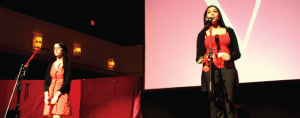The weekend of Valentine’s Day brought together much more than couples and sweethearts — it brought students and faculty together for a worthy cause.
Several female students at the College performed in Women in Learning and Leadership’s 11th annual production of the “Vagina Monologues” on Feb. 15, 16 and 17 in the Mayo Concert Hall.

The College’s adaptation of the monologues was inspired by Eve Ensler’s 1996 play of the same name. The original “Vagina Monologues” began with over 200 women who participated in interviews about their feminine experiences.
“Women secretly love to talk about their vaginas, (but) no one has ever asked them,” said Mary Lynn W. Hopps, director of the WILL program, during the play’s introduction.
The play has also proclaimed Valentine’s Day as V-Day, which stands for victory, valentine and vagina. The mission of V-Day, Hopps explains, is to serve as a movement that ultimately strives to put an end to violence against women.
Throughout the evening, the monologues explored a wide range of issues. The evening’s Vagina Host, junior fine arts and psychology double major Alexis Richards, explained that one of the monologues reflected the stories of women between the ages of 65 and 75.
“The Flood,” performed by sophomore women’s and gender studies major Morgan Teller, tells the story of one 72-year-old woman who never experienced an orgasm or saw her vagina as the result of an awkward intimate experience with a boy during her adolescence. It was not until she was interviewed by Ensler that she learned to overcome her embarrassment and became in touch with her body.
The audience even experienced side-splitting laughter during monologues such as “Because He Liked to Look At It.” Senior English major and Signal Features Editor Shaun Fitzpatrick’s upbeat performance reflected the story of one woman who began to appreciate her vagina after a positive sexual encounter with a man who genuinely valued the female anatomy. She initially shyed away from showing her vagina to a man named Bob due to embarrassment. However, once the woman finally exposed herself she received surprisingly positive praise from her partner.
“It was like he read my palm ... it was like studying a map. Bob lost himself in there and I was there with him in my vagina and we were gone,” she said.
While some of the monologues reflected the humorous side of feminine issues, others expressed the raw and honest reality of violence against women.
In the poignant story “My Vagina Was My Village” performed by senior English and secondary education double major Gabby Salvemini, one interviewee revealed her harsh experience with rape.
“They invaded it, butchered it and burnt it down. I do not touch now, I do not visit. I live someplace else now, I do not know where that is,” she exclaimed.
Prior the monologue, Richards told the audience a shocking statistic: in the United States alone, the number of assaulted women reaches over 250,000 annually. Moreover, nearly one out of every three women will be violated in their lifetime.
The monologues also challenged the audience to face the derogatory terminology used to describe the female anatomy. In “Reclaiming Cunt,” sophomore nursing major Michelle Guarnizo took the stage in order to redefine the word “cunt.” As she asked for people to repeat the word with her, the cast and several audience members joined in and loudly recited it.
The evening also served to honor faculty member Marla Jaksch as one of this year’s Vagina Warriors for her commitment to ending gender based violence both in the United States and abroad.
However, one of the most powerful moments of the evening was when the cast members and show’s directors were all brought together on stage.
One of the directors, senior journalism and English double major and former Signal Editor-in-Chief Jamie Primeau, asked for everyone in the audience to stand up from their seat if they or anyone they know has ever been physically beaten or violated.
After, nearly everyone in the concert hall rose in support of spreading awareness of this issue, showing the large number of women that have been abused. Hopps took note of the social injustice and made a notable call to action.
“One and one and I am done recounting. It’s time to tell a new story,” Hopps said.






